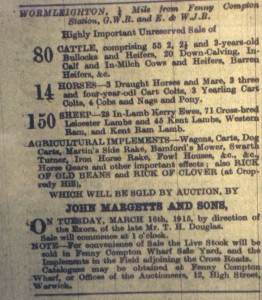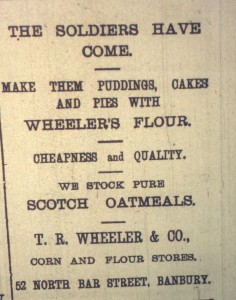Mr W. J. Weld presided at the meeting on Thursday, and there were also present – Messrs R. R. R. Brown (vice-chairman), A. Spencer, W. H. Jarvis, A. Rudge, R. H. A. Holbech, A. Fairfax (clerk), and G. Elkington (surveyor).
Death of the Sanitary Inspector
The Chairman, before the commencement of the business of the Council, said they were all very sorry to hear of the death of their inspector of nuisances, Mr Smith, and he was sure they all sympathised with the deceased family – (hear, hear). He thought their Clerk should write a letter conveying the sympathy of the Council to Mr Smith’s family.
Mr Brown – Agreed.
The Clerk said he should like to associate himself with that vote of sympathy. He had known Mr Smith a good many years; he had rendered faithful service to the Council – (hear, hear) – and he had also rendered public service in other capacities to his (the Clerk’s) knowledge. He should like to associate himself with those remarks.
The Drainage of Radway – Proposed Appointment of an Engineer
The Clerk remarked that the first item arising out of the minutes was with reference to the meeting of the District Council at Radway. They met, with the surveyor and Medical Officer of Health, and the Chairman of Radway Parish Council, and they practically suggested there should be a new sewer from the part of the village in front of the pond to the tank facing Mr Brown’s, the overflow to be carried into a ditch. The Clerk gave details of other drainage work suggested to be carried out and remarked that the committee thought the scheme should be carried out under some competent engineer.
Mr Spencer said what the Clerk had detailed was about what the committee had suggested.
Mr Brown asked if he would be in order if he gave notice that day month that the Council engage an engineer to carry out the work. He said it would not be rushing the matter if he gave that notice so that the Council could know what they were dealing with.
This suggestion was agreed to.
Farnborough Water Supply
Mr Holbech said there was another matter arising out of the minutes, which was with reference to a water question at Farnborough. He had sent to Messrs Sumner and Neal about it, and they had been to see the place referred to, but as the water was all right they did not open the well, and as Mr Smith was away, he left it to him to see when he came back. He had since seen Mr Elkington, and he (Mr Holbech) had given Messrs Sumner and Neal instructions to attend to the well, and then Mr Elkington would see it when finished. He also thought a sample of the water should be sent to Mr Bostock Hill again.
The Chairman – Yes. There is something wrong with the pump, I believe.
The Surveyor said the pump did not work properly.
Mr Spencer said there were a number of pumps in the district that did not work properly.
Mr Holbech did not think there was much wrong with the pump.
The Surveyor – the people that use it say it needs attention.
Mr Holbech remarked that Messrs Sumner and Neal were attending to the matter; they would clean the well right out. It would have been done before, only he knew that Mr Smith would have liked to have seen it.
Notifiable Disease
The Clerk reported the receipt of a circular from the Local Government Board which stated cerebro-spinal fever had broken out in some parts of the country. Instructions were being issued how to deal with the complaint. The Clerk said it was a matter for the Medical Officer of Health, and he would hand the memorandum to him.
Financial
The Clerk remarked that the treasurer since the last meeting had received from the Warwickshire Country Council £22 for salaries, and £12 7s. 8d. from Ratley. The balance in the treasurer’s hand was £241 4s. 5d.
The Medical Officer’s Report
The Clerk read the annual report of the Medical Officer of Health (Dr A. T. Johns), which stated that the deaths registered in the district were 27, but there were two deaths transferred outside the district, giving a death-rate of 19.56. Correcting this by the change in the population as shown by the Registrar-General since 1911, the rate was 15.78 against 8.09 last year. Twenty births were registered, giving a rate of 13.49 against 16.18 last year. There was one illegitimate birth. The Notification of Births Act was adopted last year, and twelve births had been notified during the year, and as there were twenty births, he presumed the Council would take action in the matter at once, so that the correct number might be notified in 1915. The housing accommodation in the district remained practically the same, and no doubt a few more houses would be acceptable in some of the villages. The inspector however, found less difficulty in getting repairs done now than formerly. With regard to the water supply, the report stated that one well at Farnborough, reported last year as unfit for domestic use, was still unfit for use, as a second sample taken during the year was found to be unsatisfactory, and he had not yet received a satisfactory report from the owners. The owners of the cottages supplied by this well should in the meantime provide a pure and sufficient water supply to their houses. The cowsheds and dairies were in a satisfactory condition. There were no offensive trades in the district. The schools were in a good sanitary condition. The general sanitary condition of the district was satisfactory.
Mr Spencer moved, and Mr Holbech seconded the adoption of the report.
Tenders for Stone and Labour
The Clerk said the usual advertisements had appeared in the papers for supplying the Council with stone, but there did not appear to be much competition, only one tender, that of Charles Abell, Ltd., Atherstone, being received.
Mr Holbech – That is the same as usual, is it not?
The Clerk – Yes. The prices were compared with those of last year, and in most cases they showed a slight increase of cost.
Mr Holbech proposed, Mr Spencer seconded, and it was agreed, that the tender of Messrs Abell be accepted.
The Clerk said he had received a letter from Mr Taylor, Winderton, which he proceeded to read. Mr Taylor said he was willing to supply the Council with local stone, making the old charge of 2s. 1d. per yard, providing he had no labour trouble, and if he had to pay more for obtaining the stone, he should have to increase his charge to the Council.
Mr Brown – That is very reasonable.
Mr Spencer – Yes.
Mr Brown – Very reasonable indeed. It was decided to include Mr Taylor’s tender with the other proposition.
The Clerk said he had received the tenders from contractors in the various parishes willing to undertake the road work, as follows:
Avon Dassett, E. Mullis, amount required £20
Warmington, J. Coggins, £20
Farnborough, W. Toy, £19 against £18 last year
Shotteswell, C. Garden, £14
Ratley, G. French, £14; A. England, £14; E. England, £15; F. W. White, £14; and R. Golby, £15
Radway, No tender.
The Clerk said there were five tenders from Ratley.
Mr Holbech (humerously) – We shall know who to go to for our labour.
Mr Spencer – Yes.
Mr Brown – No tender from Radway.
The Clerk – No.
Mr Rudge proposed, Mr Holbech seconded, and it was agreed that the tenders of those sent in be accepted. In the case of Ratley it was decided that the tender of A. England who offered to do the work for£14, be accepted.
This was all the business.

